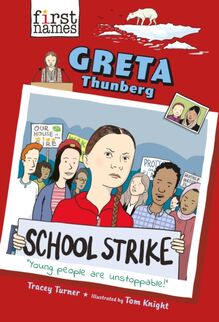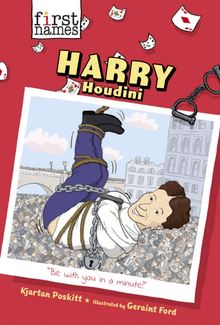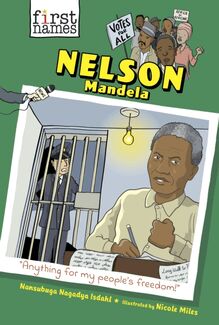-
 Univers
Univers
-
 Ebooks
Ebooks
-
 Livres audio
Livres audio
-
 Presse
Presse
-
 Podcasts
Podcasts
-
 BD
BD
-
 Documents
Documents
-
- Cours
- Révisions
- Ressources pédagogiques
- Sciences de l’éducation
- Manuels scolaires
- Langues
- Travaux de classe
- Annales de BEP
- Etudes supérieures
- Maternelle et primaire
- Fiches de lecture
- Orientation scolaire
- Méthodologie
- Corrigés de devoir
- Annales d’examens et concours
- Annales du bac
- Annales du brevet
- Rapports de stage
La lecture à portée de main
Vous pourrez modifier la taille du texte de cet ouvrage
Découvre YouScribe en t'inscrivant gratuitement
Je m'inscrisNelson Mandela (The First Names Series) , livre ebook
Découvre YouScribe en t'inscrivant gratuitement
Je m'inscrisEn savoir plus
Vous pourrez modifier la taille du texte de cet ouvrage
En savoir plus

Description
Informations
| Publié par | ABRAMS BOOKS |
| Date de parution | 28 septembre 2021 |
| Nombre de lectures | 1 |
| EAN13 | 9781647000608 |
| Langue | English |
| Poids de l'ouvrage | 4 Mo |
Informations légales : prix de location à la page 0,0450€. Cette information est donnée uniquement à titre indicatif conformément à la législation en vigueur.
Extrait
The facts in First Names: Nelson Mandela have been carefully checked and are accurate to the best of our knowledge, but if you spot something you think may be incorrect, please let us know. Some of the passages in this book are actual quotes from Nelson and other important people. You ll be able to tell which ones they are by the style of type: Well, I am not a saint The pronunciation guide at the back of the book will help you to read the African words and names.
Library of Congress Control Number 2021934539
ISBN 978-1-4197-5608-5
eISBN 978-1-64700-060-8
Text copyright 2021 Nansubuga Nagadya Isdahl
Illustrations copyright 2021 Nicole Miles
Book design by Charice Silverman
2021 as UK edition. First published in 2021
by David Fickling Books Limited
Published under license from David Fickling Books Limited. Published in 2021 by Abrams Books for Young Readers, an imprint of ABRAMS. All rights reserved. No portion of this book may be reproduced, stored in a retrieval system, or transmitted in any form or by any means, mechanical, electronic, photocopying, recording, or otherwise, without written permission from the publisher.
Abrams Books for Young Readers are available at special discounts when purchased in quantity for premiums and promotions as well as fundraising or educational use. Special editions can also be created to specification. For details, contact specialsales@abramsbooks.com or the address below.
Abrams is a registered trademark of Harry N. Abrams, Inc.
ABRAMS The Art of Books
195 Broadway, New York, NY 10007
abramsbooks.com
Contents
Introduction-Nelson Arrives at the Great Place
1-Nelson Is Named
2-Nelson Gets Some Boots
3-Nelson Heads for the City
4-Nelson Joins the Fight
5-Nelson Stirs Things Up
6-Nelson Goes on Trial
7-Nelson Undercover
8-Nelson Makes His Plea
9-Nelson Casts His First Vote
Epilogue
Pronunciation Guide
Timeline
Glossary
Notes
Bibliography
Index of Searchable Terms
Introduction- Nelson Arrives at the Great Place
THE PLACE: The royal residence of the acting king of the Thembu people, Transkei, South Africa
THE YEAR: 1930
It was late in the afternoon, the sun was setting, and twelve-year-old Nelson was exhausted. He d been walking up and down hills and along dirt roads with his mom, pulling his trusty tin trunk, since the crack of dawn. They were headed to his new home and hadn t talked much on the journey. They hadn t stopped either. But when they arrived at their destination-a large and noble-looking residence in the middle of a quaint village at the bottom of a green valley-and walked through the gates, his exhaustion was quickly forgotten.
Nelson couldn t believe his eyes. Sprawled out in front of him were two large rectangular houses with tin roofs and bright white walls, seven nice-looking huts, a large vegetable garden, peach and apple trees, hundreds of sheep, and even a church! (All sure signs of great wealth in rural South Africa at the time.) Nelson had never seen such a magnificent place before. It was far grander than the modest grass-roofed huts he d lived in for most of his life.
He d barely taken it all in when a huge Ford V8 motor car came roaring through the gate. Nelson hadn t seen many cars in his life either-back in his village of Qunu they were a rare sight. And he definitely hadn t known a single soul who actually owned a car as nice as this one.
A group of respectable elders jumped to their feet, tipped their hats, and shouted, Hail, Jongintaba. The car door opened, and a short, stout man wearing a suit emerged.
Nelson was impressed. He knew that this man, who seemed able to command the respect of other people without saying a word, was going to be his legal guardian from now on.
Thanks to his father s friendship with Jongintaba, a new world of privilege was suddenly opening up for Nelson, and it seemed both exciting and shocking! Gone was the simple, secure life he d lived with his mom. Gone was his chance to be crowned champion stick-fighter by his fellow herdboys. And gone were the evenings of listening to his father s tales of historic battles and heroic warriors.
Jongintaba had full command of the Thembu kingdom and the power to change people s lives , but he would never be king himself. He was only stepping in as regent or acting king until the real king, a young boy named Sabata, was old enough to take charge.
Nelson felt like he was being thrown into a river and carried off downstream with no idea where it would take him, but the Great Place was an important stepping-stone for him. He didn t know it yet, but living with Jongintaba would help him get to university, become the owner of one of the first Black law firms in Johannesburg, the leader of a movement that would help to free his people, and the first Black president of South Africa. A global symbol of courage, justice, and equality for everyone, everywhere, Nelson didn t just change his country; he changed the world .
You became a hero for so many people across the globe, but your fight to free your people landed you in prison for twenty-seven years! How did you survive?
1 Nelson Is Named
Nelson wasn t actually called Nelson when he was little. As a member of the Thembu people, he d been named Rolihlahla. The name means tree-shaker in his local language, isiXhosa, * but it could also mean troublemaker. In his early years, though, Rolihlahla hardly caused any trouble at all.
He d been born into the royal Thembu family on July 18, 1918.
Each tribe belongs to a clan that is traced back to a specific ancestor.
Rolihlahla s father, Gadla Henry Mphakanyiswa Mandela, had four wives and thirteen children ! In Thembu culture, it was common for a man to have more than one wife-Rolihlahla s mom, Nonqaphi Nosekeni, was his dad s third.
Gadla Henry usually only spent a week at a time with each wife, so little Rolihlahla didn t get to see him much. Then something happened that meant Rolihlahla got to see him even less.
As a village chief and royal adviser, Gadla Henry was wealthy and well respected, but he was also stubborn. When a British judge summoned him to court because of a complaint about a stray ox, Gadla Henry replied:
The king of the Thembu tribe might have named Gadla Henry chief, but South Africa was ruled by the British at the time. When the British issued an order, people were expected to listen. Refusing an order was shocking, and Gadla Henry had to be punished-so the judge took his title, most of his herd, and most of his land, no questions asked !
The British had been in Africa for a long time, though, and they d made many powerful and unfair laws:
1652 : The Dutch invaded South Africa and started a trading post at the Cape of Good Hope. The Dutch farmers, called Boers, liked the area so much that they decided to stay. They pushed the African inhabitants off their land without asking and eventually started their own colony, ruled by the Dutch government from thousands of miles away.
1700s to early 1900s: The Africans fought the Europeans, but the Europeans had a big advantage: guns. On the other hand, they were also fighting among themselves. The British had wrestled the Cape colony from the Dutch, and the Dutch battled to get it back again. In the end, the British won and took control of the South African colonies. When gold and diamonds were found in South Africa, the Europeans definitely didn t want to leave.
1910: The British brought four of their colonies together to create the country of South Africa. They dreamed up horrible laws that separated white and Black South Africans, leaving Black people with hardly any rights at all. Most of the land was given to white people (especially the most fertile areas)-Black people were left with the poorest parts, even though all the land had once belonged to them!
Because white people had taken the land by force , they had better jobs than everyone else and they were represented in government. They also made voting for other groups as difficult as possible.
A Country Life
With the family fortune gone, Rolihlahla s mom decided they should move back to her own village, Qunu, just a few miles away, where at least she d have the support of her family and friends.
Little Rolihlahla had been a herdboy since the age of five, and here he spent endless hours in the fields watching over sheep, goats, and cows or running around with his friends.
At home, at the end of the day, his mom told traditional Xhosa fables while she prepared dinner and when Gadla was there he shared tales of fearless Xhosa warriors.
Rolihlahla loved it when both his parents were around. Eventually, the family grew, and Rolihlahla got three younger sisters, Baliwe, Notancu, and Makhutswana. They lived a humble but adventure-filled life. Qunu was a small village of only a few hundred people set in a green grassy valley. Life there had a gentle day-to-day rhythm with traditions that had been passed from generation to generation.
A Window to the World
Most kids in the Western world ask their parents lots of questions. That s how they learn. But Xhosa children weren t supposed to question the decisions of any elders-including their own parents. That would have been extremely rude ! They were expected to do as they were told and to learn by watching, listening, and then imitating the adults in their life.
Boys followed in their fathers footsteps and girls followed in their mothers . But when Rolihlahla s dad became friends with two brothers from a different tribe, a window into a new world opened up for the family.
George and Ben Mbekela were a bit unusual for Qunu because they followed the Christian faith that had been brought to South Africa by European missionaries in the 1800s. They d even been educated in a Christian school. This was a pretty big deal in the 1920s because the narrow-minded government thought educating Black South Africans wasn t really worth their time .
The brothe
-
 Univers
Univers
-
 Ebooks
Ebooks
-
 Livres audio
Livres audio
-
 Presse
Presse
-
 Podcasts
Podcasts
-
 BD
BD
-
 Documents
Documents
-
Jeunesse
-
Littérature
-
Ressources professionnelles
-
Santé et bien-être
-
Savoirs
-
Education
-
Loisirs et hobbies
-
Art, musique et cinéma
-
Actualité et débat de société
-
Jeunesse
-
Littérature
-
Ressources professionnelles
-
Santé et bien-être
-
Savoirs
-
Education
-
Loisirs et hobbies
-
Art, musique et cinéma
-
Actualité et débat de société
-
Actualités
-
Lifestyle
-
Presse jeunesse
-
Presse professionnelle
-
Pratique
-
Presse sportive
-
Presse internationale
-
Culture & Médias
-
Action et Aventures
-
Science-fiction et Fantasy
-
Société
-
Jeunesse
-
Littérature
-
Ressources professionnelles
-
Santé et bien-être
-
Savoirs
-
Education
-
Loisirs et hobbies
-
Art, musique et cinéma
-
Actualité et débat de société
- Cours
- Révisions
- Ressources pédagogiques
- Sciences de l’éducation
- Manuels scolaires
- Langues
- Travaux de classe
- Annales de BEP
- Etudes supérieures
- Maternelle et primaire
- Fiches de lecture
- Orientation scolaire
- Méthodologie
- Corrigés de devoir
- Annales d’examens et concours
- Annales du bac
- Annales du brevet
- Rapports de stage










